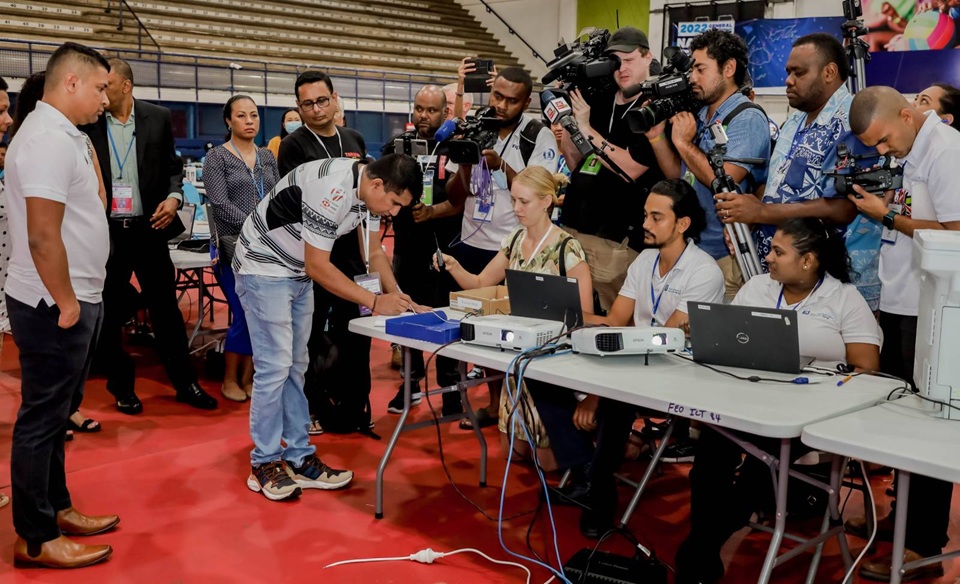Let’s rewind to August 2022, when the Fijian Elections Office (FEO) officially launched an upgraded version of its results app, which then was hailed as a bold step into a new digital era aimed at strengthening.
Fijian democracy, ensuring that election results were accessible to every voter with a smartphone.
Then Supervisor of Elections, Mohammed Saneem said the acceptance of the (election) results was the “hallmark for a free, fair and credible general election.”
“The results need to accurately reflect how people have voted,” he said.
But by midnight on polling day, what was meant to be a triumph of technology turned into what many now call “the glitch that shook democracy.”
The app’s failure, where some candidates were mistakenly shown to have tens of thousands more votes than they had actually received, sparked confusion, anger and ridicule.
Within hours, the FEO pulled the plug.
Mohammed Saneem, then the face of Fiji’s electoral machinery, apologised and blamed a “data mismatch” caused by an interrupted upload between the results management system and the app’s staging laptop.
That technical explanation did little to calm suspicions and by the next morning, six opposition parties were calling for a full recount.
While Mr Saneem maintained that the final results were based on verified protocols from polling stations and not the app, the damage to public confidence was done.
Now, three years later, the debate over the app’s future has reignited fierce public discussion.
The FEO, under Supervisor of Elections Ana Mataiciwa, has announced plans to scrap the app altogether for the 2026 polls.
Instead, results will be shared through a central media centre where journalists receive official updates in real time.
Ms Mataiciwa told a parliamentary committee that the app created “confusion for stakeholders” because of discrepancies between the app, the FEO website, and data shared with media outlets.
She also said the pressure of constant uploads had compromised verification processes during the 2022 count.
“We’ll bring back the media centre so journalists can get live, verified updates directly from the national results centre,” she said.
The announcement, however, has divided opinion sharply.
Opposition outcry
Senior Opposition MP Jone Usamate, who also serves on the Parliamentary Standing Committee on Justice, Law, and Human Rights, called the move “a step backward, not just technologically, but democratically.”
He argued that the app itself was not to blame for the 2022 errors, which stemmed from human error during manual data transfer.
“Let’s be absolutely clear, the app was never the problem,” Usamate said.
“It was a transparency tool that gave Fijians real-time access to provisional results and built public confidence. Scrapping it removes a platform that empowered citizens with unfiltered access to election data.”
Outspoken Independent MP Ketan Lal went further, describing the decision as “a blow to transparency.”
He said the FEO should invest in strengthening the system instead of dismantling it.
“We should be leading the Pacific in digital electoral transparency, not retreating into shadows,” he said.
Both MPs expressed concern that without a trusted real-time results source, misinformation could fill the vacuum.
“This is how you erode confidence in elections,” Usamate warned.
Civil society voices
Dialogue Fiji, an NGO that promotes democratic dialogue and governance, also criticised the decision.
Executive director Nilesh Lal described it as “a regrettable and backward step for election transparency, innovation, and public access to credible information.”
“The FEO app was one of the most innovative election administration tools in the Pacific,” Lal said.
“It provided real-time results, detailed historical data, and interactive features like a seat allocation calculator. Its removal is deeply disappointing and a loss for researchers, voters, and journalists alike.”
Lal warned that in the age of social media, the absence of a central, trusted source for election results could worsen the spread of disinformation.
“Without a credible hub like the app, people will start posting fabricated figures online. This will make verification harder and could undermine public trust in the entire process.”
A question of trust
For many Fijians who voted in the previous election, the ‘glitch’ is somewhat symbolic, because it exposed both the promise and ironically the pitfalls of digital democracy. While the FEO’s internal investigation later attributed the error to human oversight, questions about accountability continues to linger.
SOE Mataiciwa has promised an independent audit and a wider consultation process before the next election, including possible electoral law amendments.
“We’ll be taking a consultative approach,” she said, noting that stakeholder feedback would guide future reforms.
Still, critics argue that transparency, not retreat, should define the way forward.
“If the app had glitches, the answer should have been to fix them,” Opposition MP Premila Kumar said.
“Turning it off risks losing public trust and undermines Fiji’s global reputation as a leader in digital governance.”
As the nation draws closer to the 2026 polls, we find ourselves at a crossroads now between caution and openness, both in-terms of the question of whether or not to scrap the results app and the necessity of genuine electoral reform.
The memory of the 2022 glitch remains fresh and so too does the obvious question it left behind.
Should one flawed upload define the future of Fiji’s digital democracy, or should it rather inspire the relevant institutions to build something stronger, smarter, reliable, and more transparent?



